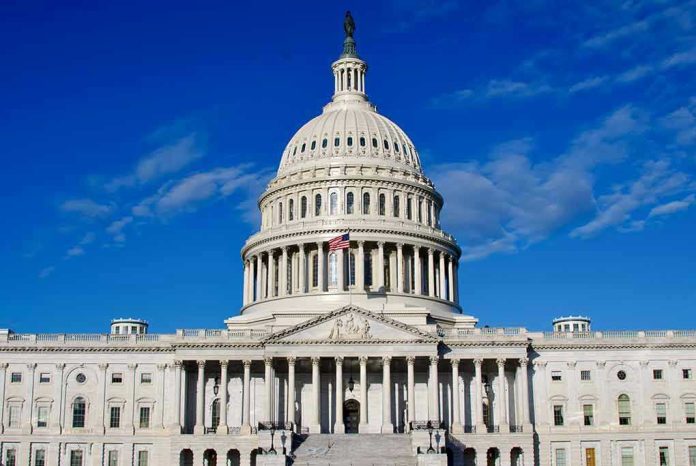
The real shock isn’t just the death of a congressional aide by self-immolation, but the swirling allegations of a secret affair at the highest levels of government—leaving a community, a political career, and the public’s trust charred and uncertain.
Story Snapshot
- Regina Santos-Aviles, senior aide to Rep. Tony Gonzales, died after setting herself on fire outside her Texas home.
- Tabloid and international media allege Santos-Aviles and Gonzales were engaged in a secret affair, though U.S. authorities have not confirmed this.
- The incident exposes deep questions about power dynamics, ethics, and public accountability in government offices.
- Official investigations have ruled out foul play, but the affair allegations and pending cause of death keep the case in the public eye.
Public Tragedy Meets Private Scandal in Uvalde
Few stories grip a community like the one that unfolded in Uvalde, Texas, on September 13, 2025. Regina Santos-Aviles, a respected regional district director for Congressman Tony Gonzales, was found engulfed in flames outside her home. She died the next day in a San Antonio hospital, and the initial investigation quickly ruled out foul play, suggesting a tragedy of unimaginable scale but no criminal element. Yet what began as a deeply personal loss soon mutated into a controversy that set political circles buzzing and the public’s curiosity ablaze.
Just weeks after her death, tabloid headlines screamed of a secret affair between Santos-Aviles and Congressman Gonzales—a married, high-profile Republican known for his work on border security and veterans’ issues. The Daily Mail and other international outlets led the charge, painting a lurid picture of personal betrayal and professional misconduct. For a nation already cynical about the integrity of its leaders, these allegations—unconfirmed by any U.S. authority—thrust Gonzales into an unwelcome spotlight and reignited old debates about ethics, workplace relationships, and the nature of power in Washington.
The Anatomy of a Political Crisis
Regina Santos-Aviles was not a political novice. As a senior aide, she played a pivotal role in serving the constituents of Uvalde—a community still reeling from its own recent tragedies. Her death, initially reported as either suicide or accident, was tragic enough. But the rumored affair, if true, would mark a significant ethical breach, raising questions about favoritism, misuse of office, and the ever-present power imbalance between elected officials and their staff. The involvement of law enforcement, the Bexar County Medical Examiner, and the Texas Department of Public Safety underscores the seriousness with which authorities are investigating every angle. To date, surveillance footage confirms Santos-Aviles was alone when the flames erupted, and the official cause of death remains pending.
Congressman Gonzales, for his part, has remained silent on the affair allegations. His office faces mounting pressure, not just from the media and political opponents but from constituents demanding transparency. The House Ethics Committee and Texas Ethics Commission are watching closely, poised to step in should credible evidence of misconduct surface. Meanwhile, Santos-Aviles’s family, her colleagues, and the entire Uvalde community are left with more questions than answers, their grief complicated by a public spectacle that shows no sign of abating.
Ethics, Power, and Public Trust Under Scrutiny
While relationships between lawmakers and staffers are not unheard of, the circumstances here are uniquely fraught. Legal experts point out that even consensual relationships in such settings carry enormous ethical risks—favoritism, conflicts of interest, and the specter of public resources being misused for private gain. The Texas Ethics Commission is unambiguous: public servants must avoid even the appearance of impropriety. In this case, the mere suggestion of an affair, amplified by relentless tabloid coverage, is enough to erode public trust and spark calls for stricter oversight of workplace relationships in government.
Some commentators argue that the coverage has crossed a line, sensationalizing unproven allegations and exploiting tragedy for clicks. Others insist that the stakes are too high for silence—if there is even a hint of abuse of power, it must be investigated. Most agree, however, that the real damage may be to the credibility of the institutions themselves, as yet another political scandal blurs the line between private failings and public responsibility.
What Comes Next: Fallout and Open Questions
As of this writing, the official cause and manner of Santos-Aviles’s death remain under review. Police and fire department statements have found no evidence of criminal activity, and the investigation is now focused on toxicology and forensic analysis. Meanwhile, the affair allegations—still unconfirmed and originating from international tabloids—continue to dog Gonzales and his office, threatening both his reputation and the public’s faith in its representatives.
The implications extend far beyond Uvalde. Congressional staffers and lawmakers alike are watching closely, aware that this case could set new precedents for ethics investigations and policy reform. For the public, the story is a grim reminder of how quickly private tragedy becomes fodder for public debate—and how, in politics, the line between personal and professional is always perilously thin. As investigations continue and the media cycle grinds on, one thing is certain: the echoes of this story will linger, challenging the very foundations of trust and accountability in American public life.




